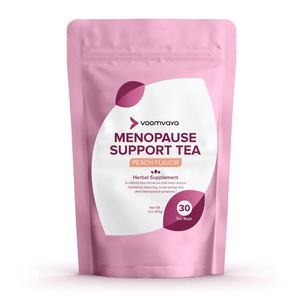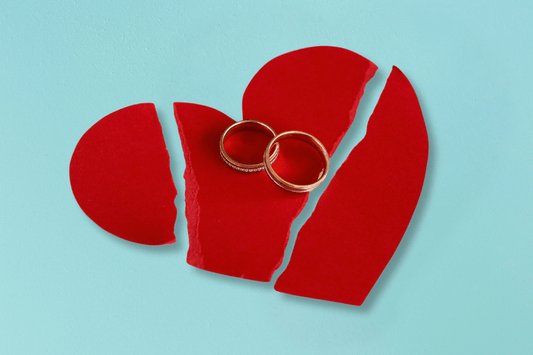Ask any woman on the street what the stereotypical menopause symptoms are and you’ll instantly hear the same answer.
Night sweats and hot flashes.
While it’s true that this dynamic duo are the most common symptoms, they’re far from the only ones, many of which get overlooked. Each woman’s experience through perimenopause and menopause can vary greatly, and not every woman experiences the same symptoms or even the same intensity of symptoms.
So how do you know if the symptoms you have are normal for menopause? There’s an overwhelming amount of information out there. Here at MenoTypes, we’ve compiled a list of 25 common menopause symptoms to help put your mind at ease about your symptoms.
Irregular Menstrual Cycles
Does any woman really miss getting her period? Before menstrual cycles disappear altogether, one of the first indicators of perimenopause or menopause is irregular cycles. This can be a tricky one to identify for women who have always experienced irregular menstrual cycles, but most women’s menstrual cycles change in some way, either becoming longer or shorter, heavier or lighter. You may also experience more periods over a shorter period of time during the early stages of menopause. In short, maybe just wait a little bit before you pitch the pads.
Hot Flashes and Night Sweats

Nothing heralds the arrival of menopause like waking up in soaked sheets feeling like your body is on fire from the inside. In general, anywhere from 50-75% of women who go through perimenopause and menopause will experience one or both of these symptoms. Hang in there. On average, hot flashes and night sweats only last five years or so. (I know, I know. Shoot us now. But it WILL get better!)
Weight Gain
“Does ANYTHING in my closet fit me anymore?” Are you noticing changes in your body when you look in the mirror these days? Another one of the most common symptoms of menopause is weight gain or weight redistribution. Although menopause itself doesn’t directly cause a woman to gain weight, the shifting hormones levels and lower estrogen production can slow down metabolism and lead to weight shifting from other parts of your body to the belly and the thighs. Greaaaaat.
Libido Changes

If you suddenly feel like declaring the three-foot diameter of space around you a no-man’s land, changing hormones might be affecting your libido during menopause. Or maybe it’s the other way around and you’ve never felt more sexy. As strange as it sounds both are completely normal during menopause. Women experience hormone changes that can vary widely, and things tend to level off, even leaning towards the increased libido side, post-menopause.
Vaginal Dryness
Though it sounds a little funny, rooibos is an herb that's commonly made into a form of tea. It is made from the leaves of the red bush plant. Also known as a member of the Fabaceae plant, it grows in South Africa and other warm climates.
This tea is heralded for many things, including the fact that it lacks the high amounts of tannins found in other forms of tea, making it healthier for you. Plus, rooibos can help boost your metabolism, since it contains aspalathin, an antioxidant that is known to reduce fat storage in the belly region, which is an unwanted side effect that is often spurred by menopause. And let’s face it, we all want to shrink any fat that decides to settle on our mid-sections.
Anxiety

“I just feel like I’m so worried about everything all the time!” If that phrase could be coming out of your mouth right now, it might be menopause. Many women experience anxiety during perimenopause and menopause. This is also due to dropping estrogen levels, which can lead to lowered levels of dopamine and serotonin levels, two vital mood regulators.
Headaches
Fluctuating hormone levels can cause an increase in the frequency or severity of headaches. This often is seen in women who experience headaches during their menstrual cycle. It’s a pretty common symptom, but we recommend checking with your doctor if they persist over long periods of time or are markedly more severe than normal. Just in case.
Digestive Problems

Prunes, anyone? Another common symptom of menopause is constipation, brought on by a drop in estrogen levels and a rise in cortisol levels. Guess what? Cortisol slows digestion.
Gum Problems
Here’s a rather unusual symptom - bleeding gums. About 10 to 40% of women experience bleeding gums and experience a metallic taste in their mouth during menopause.
Breast Tenderness

Just as in pregnancy, the hormone changes that are occur during menopause can cause breast tenderness in one or both breasts. But good news - once your body is no longer producing estrogen, this symptom tends to go away for the majority of women.
Muscle Tension
Does menopause have you waking up feeling like you just ran a marathon? You’re completely normal! During menopause, many women experience tight or strained muscles in the neck, back, or shoulders. Gentle stretching in the mornings can help ease the discomfort.
Itchy Skin

I hate to break it to you, but there’s another hormone that decreases during menopause. This hormone is called estrogen, and estrogen doesn’t like to go anywhere alone. When estrogen starts dropping, it takes collagen with it, which leads to thinner, drier (and itchier!) skin.
Fatigue
Let’s be real. Hot flashes and night sweats don’t really make for a great night’s sleep. Night after night or bad sleep can lead to a lot of fatigue, and even chronic fatigue. Chronic fatigue is like fatigue on steroids, and it can disrupt a woman’s relationships, work, and how much she can handle during her everyday life. Give yourself grace and rest when you can.
Memory Lapses
You’ve heard of baby brain, that foggy, sleep-deprived state many mothers of newborns experience. Well, menopause has its own version of brain fog, brought on by a dip in estrogen and progesterone, which contribute to memory and brain function. So if you find yourself drawing a blank when it comes to remembering your social security number or husband’s pants size, you’re not alone.

Mood Swings
One minute you’re laughing and the next you’re crying … and you have NO idea why. Welcome to menopause. Fluctuating hormone levels can cause mood swings. Wheeeeeee!
Hair Loss

Seeing a lot of hair on your pillow or in the shower drain lately? This is also a common symptom of menopause due to dropping estrogen levels. Hair may also become drier and more brittle due to the dip in estrogen. Is estrogen loss just the bane of our existence? Yes, yes it is.
Difficulty Concentrating
You walk into the office to look for a book and see your keys on the counter. You should probably put those away, so you pivot, grab the keys, and head for the key hook by the door. On your way to the door, you see yesterday’s mail and remember you need to order stamps.You sit down at the kitchen island with your cell phone to order stamps and see a notification for an email you’d been waiting for … two hours later you still haven’t found the book - or accomplished much of anything.
You guessed it, this is another common symptom of menopause. Many women have trouble concentrating during perimenopause and menopause, most often at the beginning. This symptom will likely improve as hormones level out.
Electric Shock Sensation
Have you ever stuck your finger in a light socket? Not pleasant, right? This symptom of menopause feels like a rubber band has been snapped between your skin and your muscle. For many women, these sensations are a warning of an incoming hot flash. So at least there’s that.
Urinary and Bladder Infections
Many menopausal women experience an increase in urinary and bladder infections due to hormonal changes - it’s not just you.
Sleep Disorders
Feel like you’re sleepwalking through the day? Welcome to the club. Between the night sweats, hot flashes, and anxiety, sleep loss is very common among menopausal women. Unexplained Dizziness You’re not seasick - it’s just menopause. It’s unsettling to suddenly feel a wave of dizziness, but it’s a common occurrence for women in perimenopause or menopause. Once again, fluctuations in hormone levels is the culprit.
Allergies

“I can’t stop sneezing, but I don’t have a cold. What’s the deal!?” Break out the antihistamines, because SURPRISE! Menopause can make some women more sensitive to allergies.
Brittle Nails
When your mani doesn’t last, it might be menopause. Brittle and fragile nails are also a sign of hormonal imbalance. Some women also find that their nail polish peels more than usual.





